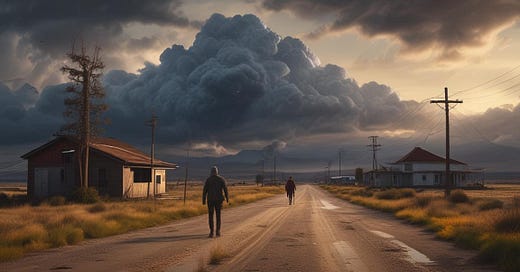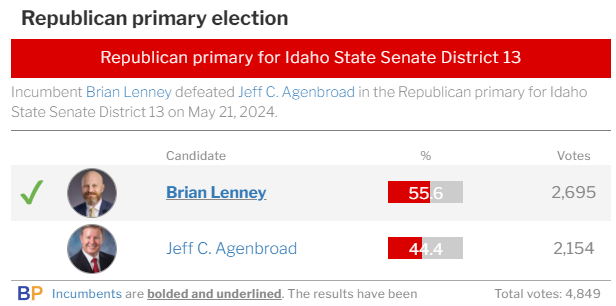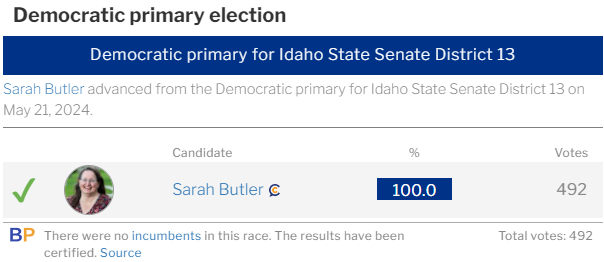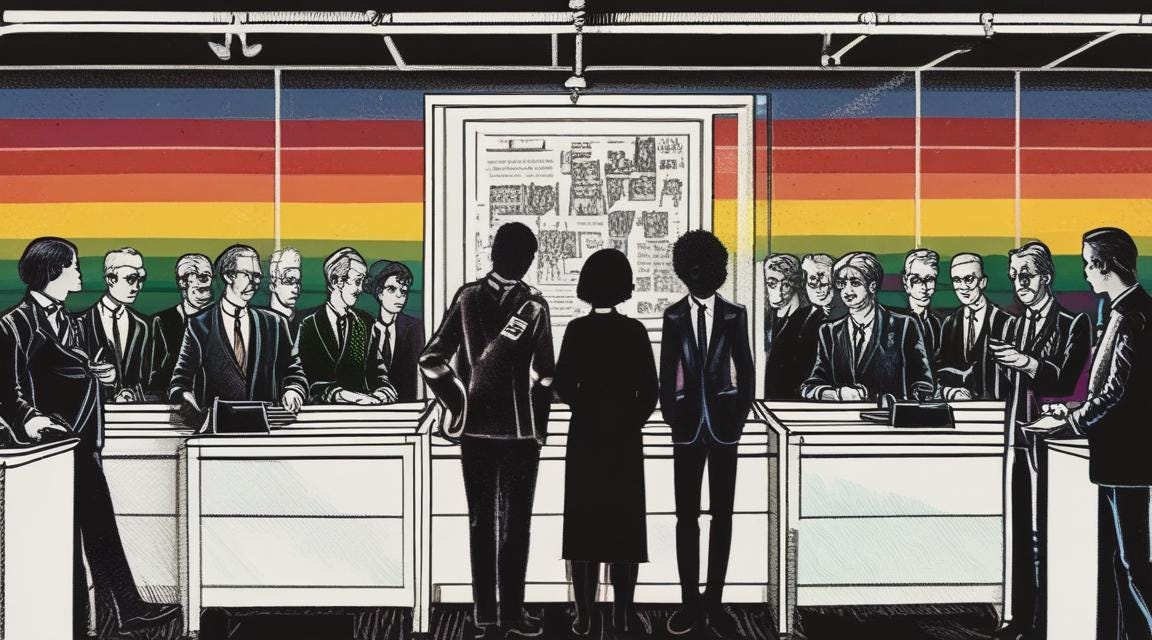The Conservative Nightmare in Idaho
Here's a Step-by-Step Breakdown of How Ranked-Choice Voting Could Hand Power to RINOs and Democrats Across Idaho
We need to have a serious talk about Proposition 1...
If you haven’t heard about it yet, let me tell you: this is the most dangerous political trick Idaho has faced in decades. It’s a ticking time bomb specifically designed to destroy our conservative values and flip Idaho blue. Because what Prop 1 does is enact a top-four “jungle primary” combined with somethign called “ranked-choice voting (RCV).”
To put it plainly: it’s a scam- a rigged system designed to confuse voters, split the conservative vote, and hand power over to liberals and liberal Republicans.
Let’s get specific about what this could mean for District 13 in Nampa, Idaho (my district). I’ve been honored to serve you, winning two primaries against liberal Republican Jeff Agenbroad. In 2022, I beat him with 57.6% of the vote, pulling in 3,162 votes to his 2,330.
That was a 15% margin—a clear, solid victory for conservative values:
In 2024, it was the same story…
Despite blasting me with 9 months of non-stop TV attack ads, spewing lies, and blowing over $300,000 to try and take me down, Agenbroad lost—again. I crushed him with 55.6% of the vote, earning 2,695 votes to his 2,154.
Once again, Nampa sent a loud, unmistakable message…
District 13 stands for bold, uncompromising conservative values, and no amount of liberal money or smear campaigns will change that:
Now let’s talk about Sarah Butler, my Democrat challenger in the upcoming general election.
She’s not even close to being a threat in a fair election—she squeaked by with just 492 votes in her uncontested primary this year. Like Kamala Harris, she was the only Democrat in the race, and yet she could barely get 500 Democrats to show up for her in a district with tens of thousands of voters.
Sarah Butler's 492 votes in her uncontested primary represent around 7% of the Democrats in the district.
That's a dismal turnout, showing just how little enthusiasm there is for her campaign:
As it stands now, the numbers don’t lie: Butler doesn’t have a chance when only 30% of Nampa votes Democrat.
In fact, if you look at the 2020 general election for District 13, Melissa Sue Robinson, the Democrat, only managed 6,290 votes, which was a weak 29.2% of the vote. Meanwhile, Agenbroad cruised to victory with 70.7% or 15,222 votes.
The truth is, the Democrat base in this district is limited and weak.
In every election in the history of District 13, it’s always been a clear Republican win. And it doesn’t even matter who the Republican is, because even when you get someone like Jeff Agenbroad (who’s basically a Democrat in disguise) Republicans still win:
That’s why Proposition 1 is such a danger…
It’s an attempt to change the rules because they know they can’t win a straight-up fight. Under this new system, we’d all be thrown into a jungle primary, and the top four vote-getters—no matter what party—would move forward to the general election. So instead of a head-to-head contest, we’ll end up with four candidates on the ballot in November, and that’s where things get messy.
Here’s the worst part: ranked-choice voting (RCV). It sounds harmless on the surface, but it’s built to manipulate the outcome.
What District 13 Could Look Like if Prop 1 Passes
Here’s how voting and elections “work” under the proposed system.
When you vote, you don’t just vote for your top choice. You have to rank all the candidates. So, let’s say I’m your first choice (and I hope I am!). Maybe you leave Agenbroad off your ballot entirely, because he doesn’t represent your conservative values. And of course, Butler is your last choice.
But here’s where things get tricky!
Butler, the Democrat, would almost certainly be eliminated first. She’s only got her small base of 492 primary voters and whatever Democrat voters she can round up—(like the 6,290 voters Robinson got in 2020). That’s not enough to win outright, so she gets knocked out of the race.
But under RCV, her votes don’t disappear—they get redistributed to the second-choice candidate her supporters picked. And guess who that is? Agenbroad.
So, suddenly, Butler’s liberal Democrat voters are giving their second-choice votes to Agenbroad, the liberal Republican!
Agenbroad is exactly the kind of politician Democrats would support as their fallback option. He’s a soft-on-values, big-spending Republican who’d cozy up to them in a heartbeat. So while I may win the first round decisively, RCV lets the second-place loser crawl back into the race by scooping up Democrat second-choice votes. Even though you, the voters, made it clear you wanted a true conservative to represent you, the system would be rigged to help the moderate, squishy Republican pull ahead in the final rounds.
By the time they’re done doing their “serious math,” I could lose the election—despite winning the most first-choice votes.
That’s the whole point of ranked-choice voting: it gives losers a second chance and lets them sneak into office by riding on the backs of second-choice and third-choice votes.
If you think this sounds far-fetched, just look at Alaska…
That’s a 60% Republican state, but thanks to ranked-choice voting, Sarah Palin—who led in the first round—lost to a Democrat in a special election. The same trick they pulled in Alaska is exactly what they’re trying to pull off here in Idaho.
Don’t think for a second that this couldn’t happen in District 13.
Because the people pushing Proposition 1 are the same ones pushing a left-wing agenda here in Idaho. The folks backing Boise Pride Fest, the Democrats, and liberals in both parties who despise our values—they’re all on board with this because they know it’s their best shot at taking power without having to actually win over the majority of voters.
They need Prop 1 to split the conservative vote and give them a backdoor to control Idaho.
If this passes, Idaho won’t be Idaho anymore.
We’ll be stuck in a future where liberals and RINOs are working hand-in-hand to undermine everything that makes this state great. People like Sarah Butler—who shouldn’t even be close to power—will be just one step away from winning, all because they split our conservative vote.
And let me be clear: Agenbroad won’t protect Idaho’s values. He’s already proven that he’s willing to sell out for the middle ground. If he gets propped up by Butler’s voters in a ranked-choice election, he’ll keep doing it.
We can’t let that happen.
We have to stop this before it starts.
This is Basically, D.E.I. for Elections
Except instead of forcing woke leftist talking points down your throat, this will be shoved into Idaho’s elections. And just like DEI, Ranked-Choice Voting (RCV) and what they’re calling “open primaries” are designed to confuse, divide, and weaken us from the inside out.
Just like how DEI pushes identity politics over merit, this system pushes "fairness" over the simple principle of the majority deciding. It’s a feel-good scam, built to make losers feel like winners and to give radicals a backdoor into power.
And the people pushing it know exactly what they’re doing.
Read More:
Prop 1: A Five Gallon Bucket of Bad Ideas: https://dougwils.com/books-and-culture/books/a-five-gallon-bucket-of-bad-ideas.html
Jungle Primaries and Ranked-Choice Voting are Bad. Combining Them Is Worse: https://www.nationalreview.com/2022/09/jungle-primaries-and-ranked-choice-voting-are-bad-combining-them-is-worse/amp/











Such a clear exposition of what could happen to Idaho if Prop 1 passes. Thank you, Sen Lenney!
This excellent article will soon appear in a collection of DOZENS of articles, some videos, and an overview of Prop 1. For those who want to see most of what has been written about Prop 1 since this terrible idea was a glimmer in left-leaning brains, check out Jungle Primaries & Ranked Choice Voting (RCV) Ballot Initiative: A Race to the Bottom at https://eolson47.substack.com/p/jungle-primaries-and-ranked-choice
Australia has its own version of RCV. Voters have to rank ALL candidates. Then, as candidates drop out, their "preferences" are assigned up the line. The two major parties - Labor ~approximately Democrats in the US, and Liberal ~approximately Republican in US, end up with more or less 50% each of all the votes cast on what is referred to as the "2-party preferred basis." It's virtually impossible for any minor candidate to enter parliament regardless of how credible they are. This is a big factor in Australia being such a socialist country